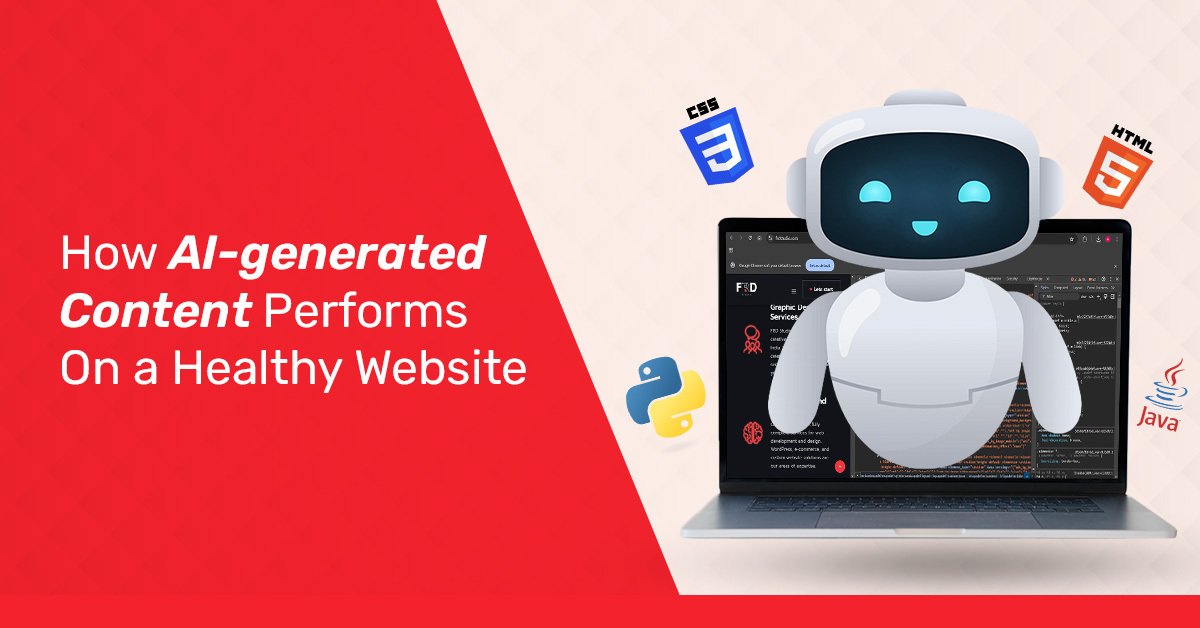AI-generated content has become a prominent trend in digital marketing and website management.
Advancements in artificial intelligence are causing businesses to swiftly adopt this technology for smooth content production.
What is the effectiveness of content produced by AI on a healthy website?
In this article, we’ll see how AI-generated content affects website performance, especially in creative fields and web design, and unpack what it implies for businesses in 2024.
FRD Studio, a creative design agency, is doing some experiments with AI-generated content. We intend to leverage their experience to consider the positive and negative impacts of AI-generated content on businesses and analyze actual data for a better perspective.
Understanding AI-Generated Content
AI-generated content includes articles, blog entries, social media posts, and various other media formats that are produced through algorithms powered by GPT (Generative Pre-trained Transformer) models.
These algorithms review a large amount of information and create human-like content, typically reducing time and cost for business operations.
AI tools are used in order to generate content for businesses that include web design agencies and marketing firms. This technology allows for content that is optimized for SEO; it promotes higher search rankings, improves the user experience, and maintains a consistent publishing schedule.
Improving the performance of websites through the implementation of AI.
1. SEO and AI-generated Content
AI artificial intelligence can strongly improve a website’s search engine optimization. Google and other search engines appraise recently published content that is relevant and high in quality.
The swift content generation made possible by GPT-powered tools in maintaining steady publishing schedules is essential for a healthy website.
According to research from HubSpot, sites that publish 16 or more blog posts every month receive 3.5 times more website traffic than those that distribute fewer articles.
2. AI in Social Media Marketing
Content produced by AI can be customized for social media campaigns, boosting engagement and bringing more traffic to your site. FRD Studio makes use of AI content creation to create graphics for social media channels including Instagram, Twitter, and LinkedIn.
Their content plan includes both innovative design concepts along content generated through AI to connect with their audience, leading to an increase in followers and a higher conversion rate.
3. Improving User Experience
User experience is a key element for a healthy website. Users can receive the precise information they seek promptly and efficiently through AI-generated content customized for their intent.
For example, GPT-based algorithms can create FAQ sections, product descriptions, and customized landing pages that help direct users toward conversions.
Real-World Case Study: FRD Studio integrated AI-generated material into both their own and various client websites. Following the integration of AI-powered content strategies, their major customer, a web design firm, noticed an uptrend in organic traffic of 25% over three months.
Keyword Optimization: AI is being used to pinpoint and implement high-traffic keywords like “AI-generated content,” “marketing,” and “social media” to make sure that the content remains relevant to search engine algorithms.
Content Consistency: You can post regularly while still achieving high quality, thanks to the help of AI.
The Benefits of AI-Generated Content for Design Agencies
1. Time Efficiency
Creating new content from scratch can be a challenging task, but the utilization of AI-generated content tools speeds up the process, enabling designers and marketers to emphasize strategy and creativity.
2. Cost-Effectiveness
Hiring a full-time content writer or outsourcing could not be possible for all, but now AI tools provide a cost-effective alternative. According to Forrester Research, businesses could reduce their content creation costs by 30% with the help of AI-powered tools.
3. Focusing on Customization and Personalization
Web design agencies can produce personalized content that engages their target market by using AI to customize content based on audience data. AI can now produce social media content and landing pages that speak exactly to what clients want in user behavior.
4. Scalability
AI-generated content can effortlessly meet your demands, whether it’s 10 content pieces per week or 100. Scalability is a significant benefit for creative and web design agencies that deal with many client accounts.
The Challenges of Artificially Generated Content
The benefits are obvious, yet the difficulties associated with AI content must also be acknowledged.
1. Quality Control
Though AI is sophisticated, it may not always reflect the human tone or creative nuance that certain industries require. Sometimes lags in tone, style, and originality are significant. FRD Studio uses AI to facilitate content creation, but ultimately, a human editor refines the result.
2. Risk of Duplicate Content
AI algorithms are designed to analyze internet content that already exists. This may occasionally result in problematic replication or overgeneralization in content, impacting SEO effectiveness.
3. Over-reliance on AI
Some businesses may become too reliant on AI for content creation, leading to a lack of creative diversity. It’s essential to strike a balance between AI and human input, especially for brands looking to differentiate themselves in a big, crowded market.
Data-Driven Insights for Understanding AI-Generated Content
Research by the Content Marketing Institute displays that 55% of marketers are currently employing some kind of AI for content creation, with 72% acknowledging positive outcomes. Moreover, according to findings, AI-generated content can increase efficiency levels by a margin of 30–50%, which is determined by the complexity of the intended content.
It is expected that AI-generated content will become increasingly advanced. Progressions will probably facilitate the creation of more imaginative, unique, and engaging materials.
Nonetheless, the usage of AI guarantees they still produce genuine, top-notch content that engages their audience.
Conclusion:
Utilizing AI-generated content is an effective way to improve website performance, especially for companies in creative sectors such as web design and marketing. When applied strategically, it can boost traffic, raise engagement, and optimize SEO.
Still, the human touch remains critical to making sure the resonance of the content is emotional and creative with the intended audience.







